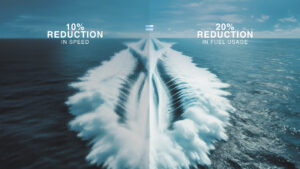
In yachting, fuel costs account for a significant portion of operating expenses. With the rise in fuel prices and increasing environmental regulations, efficient fuel usage has become more critical than ever for yacht operators. Adopting strategies for fuel efficiency can lead to substantial cost savings and reduced environmental impact.
At Peninsula, we produce a range of effective and sustainable fuels that enable efficiency. In this article, we will explore the various methods you can employ to reduce fuel usage, as well as the best fuels to fit your needs.
Practical ways to reduce marine fuel usage
Implementing practical strategies to reduce marine fuel consumption not only helps in cutting costs but also plays a vital role in reducing the environmental footprint of maritime activities. This guide explores actionable methods to achieve better fuel efficiency, ensuring smoother operations and a greener future for the maritime industry.
Reduce Speed (Slow Steaming)
Slow steaming involves operating at lower speeds than their maximum capability. This method can significantly cut fuel consumption because the relationship between speed and fuel consumption is not linear; reducing speed slightly can lead to disproportionately large fuel savings. For example, a 10% reduction in speed can lead to a 20% or more reduction in fuel usage. However, this must be balanced against operational schedules to maintain service levels.
Modern Voyage Planning Tools
Voyage planning tools can be useful for identifying the most fuel-efficient routes, however, it should be noted that yacht journeys are rarely long enough to need a planning tool. However, if it’s necessary to go on a long trip, they can be invaluable for suggesting optimal routes, thereby maximising fuel efficiency.
Advanced Weather Forecasting Systems
Weather forecasting systems are crucial for real-time data on sea and weather conditions. Integrating this data into route planning allows yachts to avoid rough seas and high winds, which can increase fuel consumption due to higher resistance and the need for speed adjustments. For short passages, accurate weather forecasting is essential to make the most of every voyage, optimising speed and course.
Engine and Machinery Maintenance
Regular maintenance of engines and other machinery is vital for ensuring optimal performance and fuel efficiency. This involves routine checks and servicing to keep components in peak condition, thus minimising inefficiencies caused by wear and tear. Key practices include:
- Proper Lubrication: Ensuring all moving parts are well-lubricated to reduce friction and wear.
- Timely Replacement of Filters: Regularly changing fuel, oil, and air filters to maintain engine efficiency.
- Correct Engine Tuning: Keeping engines properly tuned to ensure they run efficiently and reduce unnecessary fuel consumption.
By focusing on these maintenance tasks, yacht operators can ensure their vessels perform efficiently, even during the frequent short passages typical of yachting activities.
Use High-Quality Fuel
While fuel-reducing methods can be immensely helpful, utilising high-quality and environmentally sustainable fuels that improve efficiency will also enable more efficient voyages. Choosing the right fuel can be complex, but at Peninsula, we have years of industry knowledge and expertise to help you make the best decision for your yacht fuel.
Automotive Gas Oil (AGO)
AGO, provided by Peninsula, is a high-quality fuel that meets the stringent EN 590 European standard. This fuel has a maximum sulphur content of 10 ppm, ensuring minimal environmental impact and optimal engine performance. Using high-quality AGO ensures complete combustion, reduces the risk of engine deposits, and lowers maintenance costs.
BFuture Hydrotreated Vegetable Oil (HVO)
As HVO can vary in specification, Peninsula has created BFuture, the best and most sustainable HVO on the market today. BFuture HVO is made exclusively from second-generation renewable sources, ensuring maximum reduction in harmful emissions. This high-quality, sustainable biofuel is designed to provide consistent performance and reliability, making it an ideal choice for environmentally conscious yacht operators, as well as improving efficiency, and reducing overall fuel usage.
One of the standout features of BFuture is its ability to lower CO2 emissions by up to 90% compared to regular diesel. This drastic reduction in greenhouse gas emissions is a significant step towards combating climate change and supports global efforts to lower carbon footprints. Additionally, BFuture’s higher energy content delivers more power per metric ton (MT) than conventional diesel. This higher efficiency translates to better performance and longer cruising ranges for yachts, reducing overall fuel consumption and enhancing fuel economy.
BFuture also promotes more complete combustion due to its high cetane number, resulting in more efficient fuel usage and lower emissions of unburned hydrocarbons. This leads to cleaner air and less environmental pollution, contributing to the well-being of marine environments and coastal communities. Furthermore, using BFuture reduces exhaust smoke by approximately 35%, significantly improving air quality and minimising the environmental impact of yachting activities.
Utilise Fuels with Low Water Solubility and Minimal Microbial Growth
BFuture’s non-polar nature results in minimal water content and low water solubility, which are important characteristics for maintaining fuel integrity. Low water affinity reduces the risk of microbial growth, a common issue in marine fuels that can lead to clogged filters and engine problems. By choosing a fuel with these properties, operators can ensure smoother and more reliable engine performance, reducing the need for maintenance and downtime.
Compatibility and Ease of Use
One of the significant advantages of BFuture is its compatibility with existing diesel engines. It can be used in its pure form (100% concentration) or blended in any ratio, such as HVO20 (20% HVO and 80% diesel). This flexibility allows for seamless integration into current operations without the need for engine modifications. By making the switch to BFuture, captains can easily transition to a more sustainable fuel option without incurring additional costs for equipment changes.
Invest in Effective Fuel Monitoring and Management Systems
Although the vast majority of yachts have fuel monitoring systems installed, many need to utilise them more effectively. Installing these systems is just the first step; the real value comes from leveraging the data they provide.
Develop a Comprehensive Fuel Management Plan
To maximise the benefits of fuel monitoring, it’s crucial to implement a well-defined fuel management plan. This plan should include:
- Regular Cycling of Standing Fuel: Routinely cycling fuel through filters.
- Fuel Cleaning/Polishing Systems: Using onboard systems to clean and polish fuel, preventing degradation and water contamination over time.
Data Analysis and Adjustments
By analysing data from fuel monitoring systems, operators can make informed decisions to optimise fuel usage. Key strategies include:
- Adjusting engine power.
- Optimising load distribution.
- Refining speed settings based on accurate consumption patterns.
Implementing these practices will ensure that yachts operate more efficiently, reduce fuel waste, and maintain the integrity of the fuel supply.

Conclusion
Efficient marine fuel usage is a multifaceted approach that involves optimising speed and route, maintaining equipment, adopting advanced technologies, and ensuring crew training and awareness. The maritime industry’s shift towards greater fuel aligns with global efforts to reduce carbon emissions and combat climate change.



